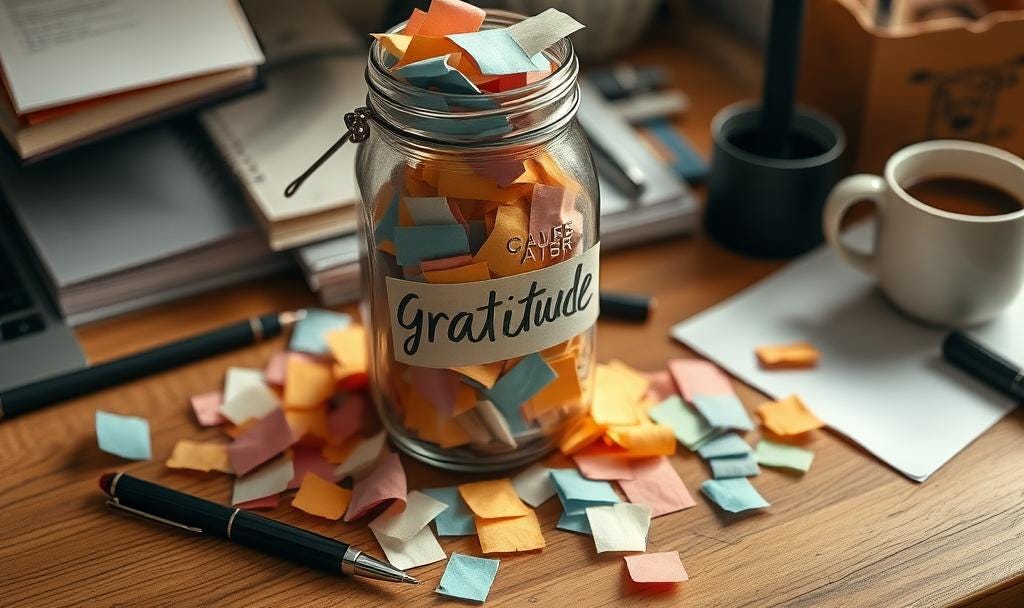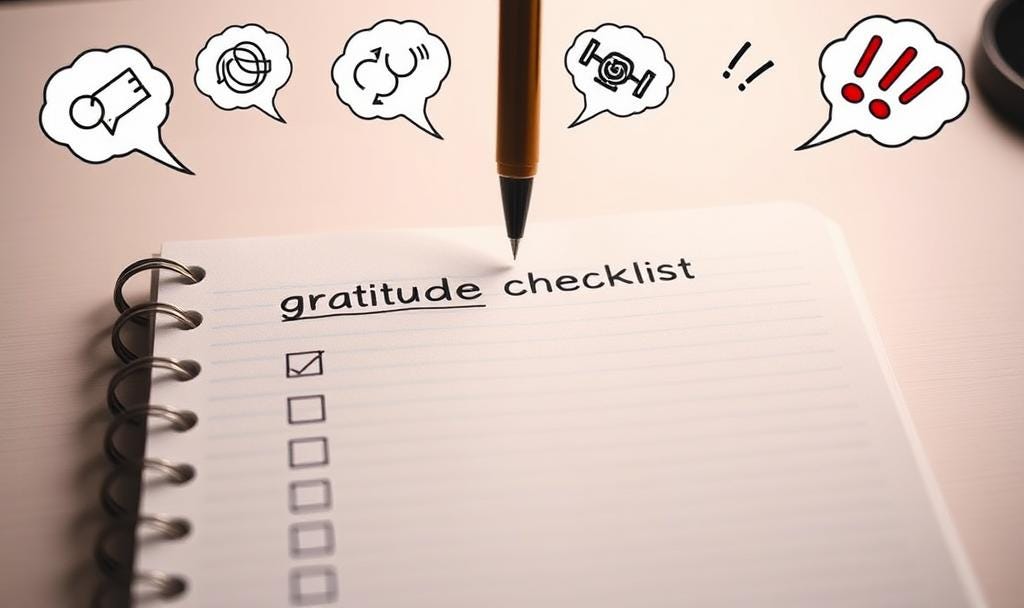When Gratitude Starts to Feel Like Gaslighting
Proof that I can, in fact, gaslight myself with a ballpoint pen.
Hey, checking in, because the quiet stuff matters too.
Today’s reflection: what happens when gratitude stops feeling like healing, and starts feeling like a guilt trip in disguise.
I was journaling the other night, you know, the kind of half-hearted journaling where you’re just trying to get credit for showing up, when I caught myself writing the exact same line for the third day in a row: “I’m grateful for my health.”
Which is true. I am grateful. But in that moment, it didn’t feel like healing; it felt like I was turning in homework late and hoping the teacher wouldn’t notice. The gold-star energy was gone. Worse, it felt like I was gaslighting myself (if there’s such a thing). Because underneath the tidy sentence was a very real knot of stress and anger I was basically shoving aside with a polite “but hey, at least I have lungs.”
Gratitude, weaponized by yours truly. Nothing like telling yourself to “cheer up, others have it worse” while simultaneously pretending this counts as personal growth.
And that’s when it hit me: sometimes gratitude stops being medicine, and starts being a guilt trip in disguise.
I’ve spent a lot of my life with an anxiety disorder, which means I’ve been sold gratitude as a sort of emotional miracle cure. “Write three things you’re grateful for every day, and your panic attacks will magically shrink!” Spoiler: they didn’t.
Some days, writing “I’m grateful for my health” felt less like noticing the good and more like negotiating with my own brain: “Okay, lungs, heart, eyeballs… please stop screaming at me for five minutes while I pretend everything’s fine.”Gratitude journals promised calm, but often left me with a lingering side of guilt — like I was failing therapy homework even when I wasn’t failing at life.
And yet, I kept doing it. Because maybe, just maybe, if I wrote it enough times, my anxiety would read the memo and chill out. (It didn’t.)
Gratitude with a side of guilt
There’s a particular kind of discomfort that sneaks in when you realize gratitude, the practice that’s supposed to lift you up, has started to weigh you down.
Not because you hate it. Not because you don’t believe in noticing the good. But somewhere along the way, gratitude stopped being a soft place to land and started sounding more like a lecture.
It’s subtle. Gratitude still shows up in Instagram captions, in journals with gold-foil prompts, in wellness newsletters promising a “daily mood boost.” It’s sold as the emotional equivalent of drinking water: effortless, restorative, necessary. Just three bullet points a night and voilà — you’re happier, calmer, more fulfilled. (Except when you’re not. Then it’s just three bullet points and a side of shame.)
But sometimes, instead of feeling lighter, gratitude starts to feel like you’re turning in an assignment for your “Advanced Joy Seminar.” And if you don’t have three impressive things to write down, you’ve somehow failed at happiness.
The culture of curated thankfulness
We live in a world that sells gratitude as a lifestyle product.
There are gratitude challenges on TikTok. $40 journals that promise transformation in “just five minutes a day.” Influencers perched on linen sofas with matching mugs and captions like “Coffee, morning light, fresh starts. Grateful ✨.”
Even science joins the chorus. Research suggests gratitude can strengthen relationships, boost optimism, and help us notice the good in life, which is true, but only when it’s real. Otherwise, you’re just scrambling to fill out a template like you’re cramming for a pop quiz in Thankfulness 101.
The problem isn’t gratitude itself. It’s how we’ve turned it into another chore. Another thing to optimize. Another silent metric we can fail. (Congratulations: you’re not just behind on your life, you’re behind on noticing it.)
When gratitude gaslights you
Gratitude gets tricky when it stops being an invitation and starts being a demand. Here’s what that looks like:
Toxic positivity in disguise. Gratitude gets used like duct tape over pain: “At least you have a job.” “At least you’re not alone.” “At least you’re not starving in the 1600s.” Translation: stop complaining. Your feelings don’t count. (Bonus points if someone says this while sipping a $9 green juice and smiling like the universe just whispered a secret.)
Comparative suffering. Gratitude turns into a competition you never signed up for. You’re stressed? Someone else has it worse. You’re lonely? Others are lonelier. Instead of comfort, you get shame. Instead of space for your pain, you get a guilt trip with a side of faux wisdom.
Obligation over choice. Gratitude becomes a nightly checklist. Three items due by bedtime. Half my old entries read like hostage notes:
I am grateful for my health.
I am grateful for my job.
Please stop making me write this.
Emotional wallpaper. Gratitude starts covering over cracks in the wall. It looks neat on the surface, but the leak is still spreading underneath. Gratitude isn’t spackle. It’s not going to fix your basement. (Also: nobody wants a gratitude-themed home renovation.)
Story time: me, my journal, and the guilt spiral
I once owned one of those sleek Five Minute Journals. You know, the kind with prompts designed to make gratitude feel foolproof. At first, I loved it. The ritual. The structure. The idea that I was literally “training my brain for joy” like it was a golden retriever.
But after a few months, something shifted.
If I wrote, “I’m grateful for my friends,” a quiet voice followed: So why do you still feel lonely sometimes?
If I wrote, “I’m grateful for my job,” it whispered back: Then stop complaining about burnout.
What started as a practice of noticing quickly turned into emotional gaslighting. My gratitude list wasn’t softening me. It was scolding me.
That’s when I realized: gratitude only heals if it’s invited. The minute it’s forced, it curdles into guilt. Like milk left out overnight. But with more cursive fonts.
Why this happens
Part of why gratitude can backfire is how we’re taught to do it: packaged, optimized, and often forced. Capitalism sells journals, courses, prompts, and hashtags. Culture promises fast emotional fixes. We want quick relief from big feelings, but joy rarely works like an energy drink.
The result? Gratitude can feel like a checklist, a performance review, or a polite scolding from your own notebook. Instead of softening the edges, it can sharpen them, turning a practice meant to lift us up into a guilt trip in disguise.
What gratitude looks like when it’s not gaslighting
So how do you practice gratitude without it turning into guilt?
Permission to hold both. You can be grateful and grieving. You can love your kids and still need a break. You can appreciate your health and still be scared. Gratitude doesn’t erase the hard; it just shares the table with it.
Let it be organic. The best gratitude sneaks in; the way morning light hits your kitchen counter, or the random meme that made you laugh too loud in public. That counts. You don’t need bullet points and a gold pen for it to matter.
Ask softer questions. Instead of “What am I grateful for today?” try:
What made me pause?
What surprised me?
What tiny thing felt like relief, even for a second?
This turns gratitude into curiosity, not homework.
Lead with compassion. Gratitude isn’t about canceling complaints. It’s about layering kindness on top of reality. Yes, I’m grateful for coffee. And no, it doesn’t solve capitalism. Both can be true.
A different kind of gratitude
The gratitude that feels most real to me rarely makes it onto a list. It’s smaller, quieter, harder to package:
The neighbor who left tomatoes on the porch.
The stranger who held the elevator.
The friend who texted “thinking of you” at exactly the wrong-right time.
These don’t feel like homework. They feel like grace. Like proof that joy doesn’t need to be curated or written in neat cursive.
In case you need to hear it
You’re not failing at gratitude if you don’t keep a perfect journal.
You’re not ungrateful because you still struggle, even when you notice the good.
You don’t have to turn every ache into a thank-you note for the universe.
Gratitude is an invitation, not an ultimatum. You can answer when it feels right. You can ignore it when it doesn’t.
Sometimes the most grateful thing you can do is admit you’re tired. Or sad. Or lonely. Gratitude doesn’t cancel that out. It just reminds you there’s still something worth noticing alongside it.
And… also because emotional healing isn’t always grand gestures, here’s a little honest check-in from me this week:
One thing that grounded me: Sitting on the floor to tie my running shoes and then just… staying there for a while.
Closeup of a laptop screen showing an email with the subject line “Per my last email,” on a, office desk in the morning. Sticky notes and scattered papers around, a steaming coffee cup sits untouched next to the laptop. Bright morning sunlight streams through a window, casting dramatic shadows. Emphasize humor, mild dread, and exaggeration in a slightly cartoonish or stylized realistic style.
One thing that ungrounded me: Getting an email with “per my last email” before I’d even had coffee.
Your turn: what’s one small choice, grounding or ungrounding, that shifted your week?
If you’re new here, welcome to Joydify — your soft landing for the quiet stuff that matters.
Thanks for subscribing to Joydify and sharing a quiet moment with us. Here’s to gentle support, one check-in at a time.





